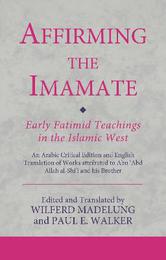
|
Affirming the Imamate: Early Fatimid Teachings in the Islamic West: An Arabic critical edition and English translation of works
Hardback
Main Details
| Title |
Affirming the Imamate: Early Fatimid Teachings in the Islamic West: An Arabic critical edition and English translation of works
|
| Authors and Contributors |
Edited by Wilferd Madelung
|
|
Edited by Paul E. Walker
|
| Series | Ismaili Texts and Translations |
|---|
| Physical Properties |
| Format:Hardback | | Pages:248 | | Dimensions(mm): Height 216,Width 138 |
|
| Category/Genre | Islam
Islamic theology |
|---|
| ISBN/Barcode |
9780755637324
|
| Classifications | Dewey:297.20422 |
|---|
| Audience | | Tertiary Education (US: College) | |
|---|
|
Publishing Details |
| Publisher |
Bloomsbury Publishing PLC
|
| Imprint |
I.B. Tauris
|
| Publication Date |
25 February 2021 |
| Publication Country |
United Kingdom
|
Description
The two sermons edited and translated here for the first time are primary material from the years before the establishment of the Fatimid caliphate in 297/909. The authors have been identified as Abu 'Abd Allah al-Shi'i and Abu'l-'Abbas Muhammad, two brothers who were central to the success of the Ismaili da'wa in North Africa. Da'wa, a term used to describe how Muslims teach others about the beliefs and practices of their Islamic faith, therefore provide a unique view of the nature and development of Islam throughout history. In this case, the primary texts shed light on the development of Islam among the Berbers of the Maghreb. The first text by Abu 'Abd Allah al-Shi'i shows how the arguments for belief in the 'imamate' of the family of the Prophet, that is, the Shi'a belief that all imams should be spiritual descendants of the Prophet Muhammad and his household, were developed and presented to bring new adherents to the cause. The Book of the Keys to Grace by his elder brother Abu'l-'Abbas, too, concerns not only the centrality of the imam in the faith but also sheds light on the hierarchy of the da'wa in this early period and its organisational sophistication. Both texts also reveal the contemporary theology propagated by the Ismaili da'wa, including for instance, the powerful analogy of Moses/Aaron and Muhammad/'Ali, the awareness of a variety of religious traditions and the use of detailed Qur'anic quotations and a wide range of hadith. As such they constitute primary source material of interest not only for Ismaili history but for this early period of Islam in general.
Author Biography
Wilferd Madelung is Senior Research Fellow at the Institute of Ismaili Studies, U.K having been Laudian Professor of Arabic at the University of Oxford, U.K. He has published widely over his distinguished career, including the books Der Imam al-Qasim ibn Ibrahim und die Glaubenslehre der Zaiditen (1965), The Succession to Muhammad; A Study of the Early Caliphate (1998) and many encyclopaedia articles. He is Editor-in-Chief of the Encyclopedia Islamica (2008-) Paul E. Walker is Deputy Director for Academic Programs at the Center for Middle Eastern Studies at the University of Chicago, U.S.A. Previously he was Director of the American Research Center in Egypt. As a specialist in the history of the Islamic thought, he has published over twelve books, among them Early Philosophical Shiism (1993), Hamid al-Din al-Kirmani: Ismaili Thought in the Age of al-Hakim (1999), The Advent of the Fatimids (with Wilferd Madelung; 2000), Exploring an Islamic Empire: Fatimid History and Its Sources (2002), and Caliph of Cairo: al-Hakim bi-Amr Allah, 996-1021 (2009).
|